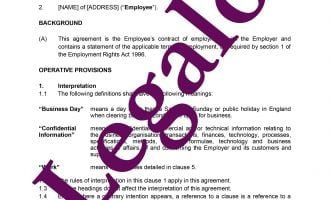Employment Contract
Our Employment Contract template
- Easy to use, reliable contract of employment
- Guidance notes in plain English
- Designed for all employees, except directors
- Complies with the requirements of section 1 of ERA 1996

How Does It Work?
-
1. Download
-
2. Edit
-
3. Print
-
4. Sign
Use our standard template employment contract to put in place a comprehensive and robust contract with your employees.
Our template enables you to put in place a contract of employment with each member of staff. It complies with section 1 of the Employment Rights Act 1996. That Act requires that all employees are given a written statement of the terms and conditions of their employment.
Our template contract contains:
- all of the essential terms you must give to your employees by law,
- plus additional clauses to protect the employer against common issues.
As a standard employment template, this document is suitable for:
- full-time and part-time employees,
- whether you engage them on a fixed-term, permanent or temporary basis.
This template is easy to use and can be customised to individual needs. A sample of the agreement can be viewed by clicking the Preview button above right.
Drafted by David, a solicitor of 30 years, who specialised in Employment and Company law, you can be assured of getting a great document that will protect your position as an employer and meet your company’s legal obligations.

Using our Employment Contract template
Once you have bought it, you will be able to download the document in Word format to your computer. You can then edit it to suit your needs.
As with all of our employee contracts and templates, you get updates to the template free of charge for life. As and when we update the template, you will be notified and the new version will be available for download in your Legalo account that you created when you bought the document.
You will find all the standard clauses that the law in the UK requires for an employment contract. There are also clauses that you can use to customise the template to your specific situation. We have made editing the template easy for you by marking it with square brackets around the relevant parts of the text. What you need to do we have also explained in the guide that comes with the template. If you wish to preview the template, just use the “Preview” feature on the page before you buy anything.
Our detailed guidance notes (free with the Employment Contract template) make adapting the Employment Contract easy and quick. A summary of the guidance notes are available here: guide to this Employment Contract template.
Understanding Terms of Employment
The Employment Rights Act 1996 requires that a written statement of the employee’s terms of employment is provided to the employee within two months of starting work. When you provide a written statement of terms to the employee, both parties should sign it. It then forms a legally binding contract.
During the 2-month period, you can use our Job Offer Letter if you prefer to set out the core terms of employment and then put in place a full contract before the two-month period ends.
Many companies use this two-month period as a probationary period. However, you can extend a probationary period for up to six months.
We have designed this draft for use by you with all your junior staff. For directors, managers, sales staff and other key or senior employees, please use our Director’s Service Agreement template. Among other matters, that document includes additional clauses that give the company more protection against an employee’s leaving to work for a competitor and pinching customers, ideas or intellectual property rights from your business, and thus causing potentially serious difficulties for your business.
Since a UK lawyer who is familiar with employment law has written our Employment Contract template, you can buy with confidence.
Other Employment Contract Templates that we offer
Have a look at our other employment contract documents, if you need something more specialised:

FAQs on Employment Contracts
Below, we have answered the most popular questions from the Internet on this topic.
Is it a legal requirement to have an employment contract?
In the UK, having a written employment contract is not strictly required by law. However, employers have a legal obligation to provide employees with a written statement of employment terms within two months of starting their employment. This statement typically outlines important terms and conditions of the employment, making it essential to have a written document, even if it doesn’t have to be a formal contract.
It is advisable for employers to have comprehensive employment contracts in place to protect the rights and expectations of both parties involved. These contracts have several advantages:
- they can provide more clarity than the basic statement of employment terms;
- they help to minimise disputes; and
- ensuring a fair working relationship.
Can I write my own employment contract?
You have the option to create your own employment contract in the UK and while it is not obligatory to involve a solicitor or HR professional in the drafting process, their assistance can be beneficial. Alternatively, you can use a great template, like the one from Legalo, as your starting point and save significant money.
When creating the employment contract, it is important to ensure that it meets legal requirements, includes all the essential terms (such as job title or role, pay, and working hours) and complies with employment laws. Using a template like ours at Legalo will ensure that the contract is comprehensive and safeguards the rights of both the employer and the employee, without breaking the bank.
What are the 4 types of employment contracts in the UK?
In the UK, the 4 types of employment contracts are:
- Permanent Contracts: These contracts provide continuous employment without a fixed end date. They can be full-time or part-time. They terminate once one party gives the required period of notice.
- Fixed-Term Contracts: These contracts have a specific end date or are tied to the completion of a particular project.
- Temporary Contracts: Typically used for short-term positions or to fill temporary staff vacancies.
- Zero-Hours Contracts: These contracts offer flexibility to the employer, as they do not guarantee a specific number of hours to the employee. Employees work as and when required. Employees should be free to work elsewhere in the meantime.
Each type of contract carries distinct legal implications concerning employment rights and obligations. It is crucial to select the appropriate contract type that aligns with your specific needs and circumstances.
How binding is an employment contract?
In the UK, an employment contract holds legal binding status and establishes a mutually-enforceable agreement between an employer and an employee. It sets out the rights, obligations, and other terms of employment for the benefit of both parties. If either party breaches the terms of the contract, the other party has the right to seek legal remedies or terminate the employment. However, it is essential to ensure that the contract adheres to employment laws, as certain terms may not be enforceable. Additionally, if poorly drafted, employment rights can supersede the terms of the contract. Hence, while employment contracts are binding, they must comply with legal regulations and ensure fair treatment for all parties.
Can I be fired if I don’t have a contract?
It is still possible to be dismissed from employment even without a written contract. Employment rights and obligations are governed by statutory laws, and the absence of a written contract does not nullify those rights. However, it is a legal obligation for employers to provide a written statement of employment terms within two months of commencing employment. This statement outlines key terms and conditions. If you are dismissed without a contract, you may still possess legal rights and could potentially challenge an unfair dismissal if it is deemed applicable.
Can I sue my employer for not giving me a contract?
In the UK, you cannot initiate a lawsuit against your employer solely for their failure to provide a written employment contract. However, employers are legally obligated to furnish a written statement of employment particulars within two months of the commencement of employment. If an employer fails to fulfil this obligation, you have the option to report the matter to an employment tribunal, which may then order the employer to provide the statement. In cases where other employment rights have been violated due to the absence of a written contract, it is possible to seek compensation.
How long can you work without a contract?
In the UK, it is permissible to work without a formal written employment contract. However, it is crucial to provide your employees a written statement of employment terms within two months of their beginning work. While it is possible to work without a contract, it is advisable for both the employer and the employee to establish one as soon as possible. Having a written contract helps:
- protect the rights and expectations of both parties involved; and
- avoid misunderstandings that could lead to disputes.
What must an employment contract include?
A comprehensive employment contract in the UK should include critical information, such as:
- Names of the employer and employee
- Job title or role, and job description
- Start date and, if applicable, end date (if a fixed-term contract)
- Salary or wage details
- Working hours
- Place of work
- Holiday entitlement
- Notice period for termination
- Grievance and disciplinary procedures
- Terms related to sick leave and pay
Along with this essential information, employers and employees can include additional provisions that cater to their specific needs. It is important to ensure that any additional provisions comply with employment laws and maintain fairness for both parties involved.
What happens if I breach my employment contract?
When an employment contract is breached in the UK, there can be a range of consequences. The severity and nature of the breach determine the potential outcomes, which can include:
- Warnings: For minor breaches, employers may issue verbal or written warnings to employees, highlighting the issue and providing an opportunity for improvement.
- Disciplinary actions: More serious breaches may warrant disciplinary actions, such as suspension, demotion, or loss of certain privileges.
- Termination: In cases where the breach is significant or repeated, termination of employment may occur. However, employers must follow fair and lawful procedures when terminating an employee’s contract. Serious breaches may mean the employee is not due any notice (and no notice pay).
- Legal action for damages: If the breach causes financial harm to the employer, they may pursue legal action to claim damages from the employee. The extent of the damages will depend on the specific circumstances of the breach. However, generally the employee will not have insurance or the funds to cover significant losses, so this i not a very practical option.
It’s important to note that the consequences of breaching an employment contract are determined by the terms of the contract itself, company policies, and relevant employment laws. Both employers and employees have responsibilities to uphold the terms of the contract and adhere to fair and lawful procedures.
What is an unfair employment contract?
An unfair employment contract refers to a contract that goes against employment laws, undermines an employee’s statutory rights, or lacks essential fairness. Here are some common examples of unfair contract terms:
- Low pay: Contracts that offer wages lower than the national minimum wage or don’t provide the minimum legal amount of holiday pay are unfair.
- Excessive working hours: Contracts that require employees to work excessively long hours or without adequate breaks may be deemed unfair. Working hours must comply with the Working Time Regulations 1998.
- Overly-restrictive terms: Contracts that impose unreasonable restrictions on an employee’s legal rights, such as limiting their ability to seek alternative employment or file a complaint, can be unfair. Examples are:
- Having a zero hours contract but banning the employee from having other employment;
- Having a restrictive covenant preventing the employee from working for a competitor for a long period after the employment ends; or
- Banning whistle-blowing.
It’s important to note that unfair terms in an employment contract are likely to be unenforceable. If an employee believes their contract contains unfair terms, they have the right to challenge them in an employment tribunal. The aim of employment laws is to protect employees from exploitative or one-sided contract terms. These laws ensure that employment agreements are fair, comply with legal standards, and provide reasonable protection for employees.
How long does an employment contract last?
The duration of an employment contract in the UK can vary depending on several factors. Here are some key points to consider:
- Permanent contracts: These contracts have no set end date and are for ongoing employment. They continue until terminated by either the employer or the employee, subject to notice periods.
- Fixed-term contracts: These contracts specify a particular duration for the employment. Employers commonly use them for temporary or project-based work where the employment is due to end on a specific date or upon the completion of a certain project. If employers habitually renew fixed-term contracts on expiry, then the law may treat them as being permanent contracts as above, with no fixed term.
- Temporary contracts: Employers typically use these contracts for short-term positions or to cover temporary staffing needs. They have a clear start date and often a set end date. In the case of the latter term, the employment automatically terminates at the end of the agreed-upon period, like with fixed-term contracts.
- Zero-hours contracts: These contracts do not guarantee a minimum number of working hours. Instead, the employer engages the employee on an “as-needed” basis. The terms of these contracts should clearly outline the arrangements for scheduling the rota and payment of hours worked. The length of these contracts can be open-ended.
It’s important for the employment contract to clearly specify the duration of the employment, including:
- any probationary periods;
- notice periods for termination; and
- any provisions regarding contract renewal or extension.
Clarity in these areas helps ensure that both the employer and the employee understand their rights and obligations throughout the employment relationship.
How long can you legally be on a temporary contract?
In the UK, there is no specific legal limit on the duration of a temporary contract. The agreement between the employer and the employee generally determines the length of a temporary contract. However, it is crucial to ensure that the use of temporary contracts:
- aligns with employment laws; and
- does not undermine the rights and protections granted to permanent employees.
As noted with fixed-term contracts above, if you habitually extend or renew temporary contracts, the tribunal may later deem them to be permanent contracts, with no set expiry date. So while there is flexibility in using temporary contracts, it’s important to avoid using them in a way that circumvents the rights of permanent employees. If an employee is continuously engaged in the same role on a long-term basis through multiple temporary contracts, they may be entitled to employment rights associated with permanent positions. The law aims to prevent the misuse of temporary contracts as a means to deny individuals the benefits and protections they would normally receive as permanent employees.


